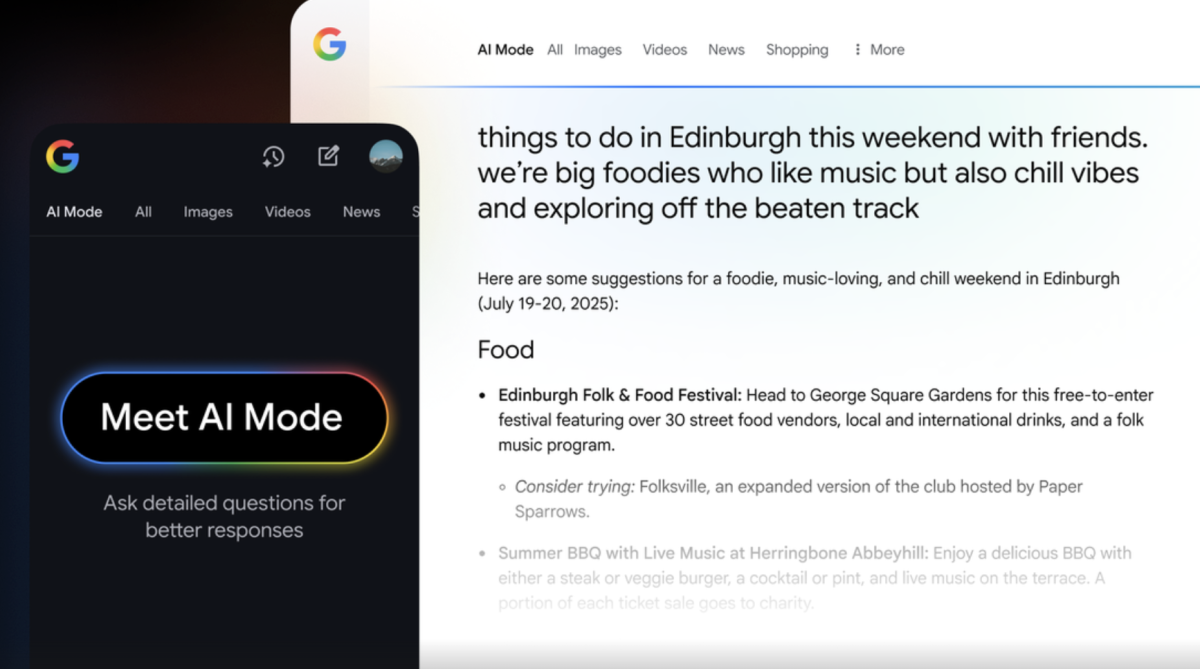
On Monday 28 July, Google asked its British audiences to “meet its new AI-mode for search results.”
A coy blogpost published by Product VP Hema Budaraju announced the tech giant’s biggest change to its primary technology function since founders Larry Page and Sergey Brin settled on the structure and design of the Google Search Engine launched in September 1998. Since its inception, Search has been the cornerstone of Google’s growth in becoming the undisputed, all-dominant information portal for digital audiences.
Forthcoming seismic changes are introduced to British audiences via a delicate blogpost citing: “Picture this: asking Google Search whatever is on your mind — as messy or complicated as it may be — and instantly receiving an AI-powered response that really understands your question, gives you the information you’re looking for and helps you dig deeper into the topic.”
Behind the casual tone lies a far more consequential shift. Google’s “AI mode” no longer simply indexes the search queries with results. The shift interprets user questions with a focus on one-on-one engagement to deliver a specific answer, marking a distinct change in the utility of Search under Google’s Gemini 2.5 language.
As stands, Google underlines that traditional results pages will still exist, yet looking at a year of blog-post updates there is no hiding that the giant is steering users toward a system where AI-generated summaries become the default experience. The ever present “10 blue links” are no longer the centrepiece, but just a fallback.
At stake for the rest of the internet is not what AI mode says, but what it does not show. Anxieties are clearly visible for publishers and media owners, but visibility in Search remains existential.
In Britain alone, Google commands over 90% of the search market, a level of dominance that was entrenched long before AI became a battle ground.
As no competitor or government has ever been able to challenge Google, the status quo simply seeks to maintain Google monopolistic rights on Search regardless of its structure…backlash is not unexpected.
“This is yet another example of Google using its dominant position in search to force news publishers to allow their content to be ingested for AI,” said Owen Meredith, chief executive of the News Media Association, quoted in The Daily Telegraph, which called the update a “major shift expected to cause turmoil across the web.”
Publishers, the article notes, are “already reeling from existing changes to Google’s search engine,” and see this new development as a deepening of their woes.
The unease is not unfounded. Pew Research data cited by the Telegraph shows that AI-powered search results drastically reduce user interaction with third-party links. Queries that include Google’s AI overview result in users clicking a link just 8% of the time, down from 15% without it. When links are embedded in AI-generated answers, the click-through rate drops to just 1%. These statistics are ominous for any digital business reliant on organic discovery.
The dilemma for publishers is compounded by the impossibility of opting out. Refusing Google’s crawl of content for AI training may prevent data extraction, but it also triggers a demotion from its search listings, effectively erasing visibility.
The UK CMA recently designated Google as having “strategic market status” in search a classification that could eventually tilt leverage back toward content providers. But regulatory wheels move slowly, whilst AI evolution continues on all tech platforms.
Wider industries are also being drawn into this new environment, though with more ambivalence. For iGaming, AI-mode could be both a threat and an opportunity. On one hand, the ability of AI to compare betting platforms or recommend casinos may displace affiliate models and SEO-dependent traffic.
Ivana Flynn – SEO
On the other, in a saturated market, a new discovery layer might offer a way to reach users differently provided operators can adjust to Google’s opaque algorithms.
iGaming SEO expert Ivana Flynn believes that Google’s approach to accountability in its new AI-driven search experience hinges on the accuracy and authority of responses. While the algorithm may evolve, she argues, Google continues to prioritise trust as its guiding principle.
“Everyone is stressing how AI overviews will impact them — of course, we all fear the unknown. But here is what we do know: if you want to appear in AI overviews, make sure your SEO carries the most detailed information.
Tech SEO is not changing quality content is still important, links are still a must. So do your best work! AI overview will bite into the organic traffic for sure, for that it is essential to be recommended as a recognised brand, aka build a good brand. I would not take any shortcuts; I would work on long-lasting quality results that are here to stay.”
Doubts aside, Google remains untroubled. All its messaging, from product announcements to interface design, signals a singular vision. AI will become an organising logic over learning language. Audiences will be guided via device specific AI-generated summaries, multimodal inputs, voice interactions, visual search—these are not add-ons, they are the blueprint. Google no longer sees itself as a curator of the web, but as its most logical interpreter.
What publishers fear is not just the loss of traffic or visibility, but being displaced by an intelligence that draws from their work, yet increasingly directs audiences away from them. As with all past revolutions in technology power and displacement, the terms are dictated by who controls the interface, a lesson learnt by Google in 1998.